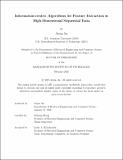Information-centric Algorithms for Feature Extraction in High-Dimensional Sequential Data
Author(s)
Jin, Jiejun
DownloadThesis PDF (912.2Kb)
Advisor
Zheng, Lizhong
Terms of use
Metadata
Show full item recordAbstract
Hidden Markov Models (HMMs) are a cornerstone of sequential data analysis, offering a robust framework for modeling observable events influenced by hidden internal states. With applications spanning speech recognition, video analysis, bioinformatics, and financial time series, HMMs enable the prediction and classification of raw data by leveraging their dual-layer stochastic structure: hidden Markov states and observable outputs. However, as real-world data grows increasingly high-dimensional, extracting meaningful features from observations becomes critical to reduce computational complexity while retaining relevant information.
This thesis addresses key challenges in feature extraction for high-dimensional HMMs. Current methods, such as neural networks (NNs), are widely used for nonlinear feature learning but lack mechanisms to prioritize useful features or incorporate known structural constraints. To bridge this gap, this work proposes novel algorithms to decouple representation learning from task-specific objectives and extract features aligned with predefined constraints.
The theoretical foundation, including local information geometry and Hirschfeld-Gebelein-Rényi (HGR) maximal correlation, is introduced in Chapter 2. Chapter 3 details three innovative feature extraction algorithms and their corresponding neural network architectures, highlighting their strengths and limitations. Convergence analyses and tail bounds for these methods are presented in Chapter 4. Numerical simulations validating the efficacy of the proposed approaches are provided in Chapter 5, while Chapter 6 concludes with a summary of contributions and potential future research directions.
This thesis advances the field by offering structured, constraint-aware feature extraction techniques tailored for high-dimensional sequential data, setting the stage for more effective and interpretable inference in HMMs.
Date issued
2025-02Department
Massachusetts Institute of Technology. Department of Electrical Engineering and Computer SciencePublisher
Massachusetts Institute of Technology